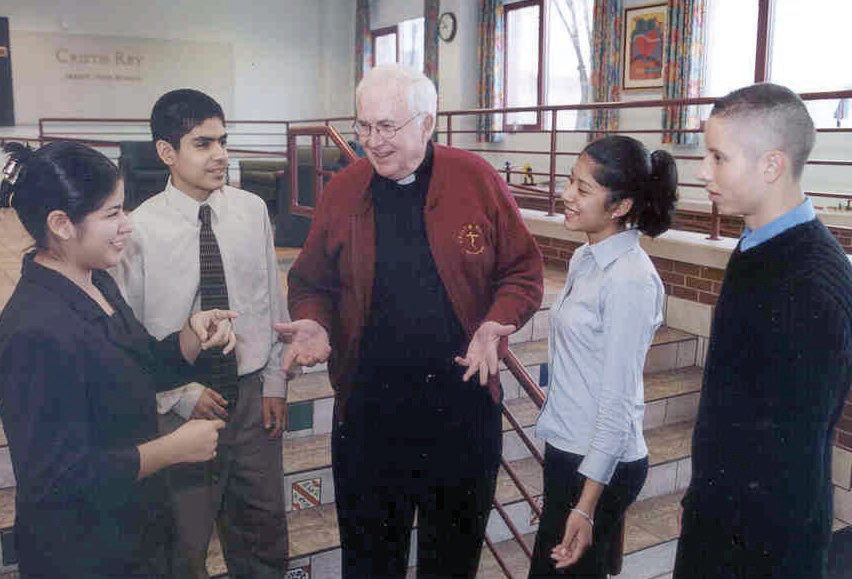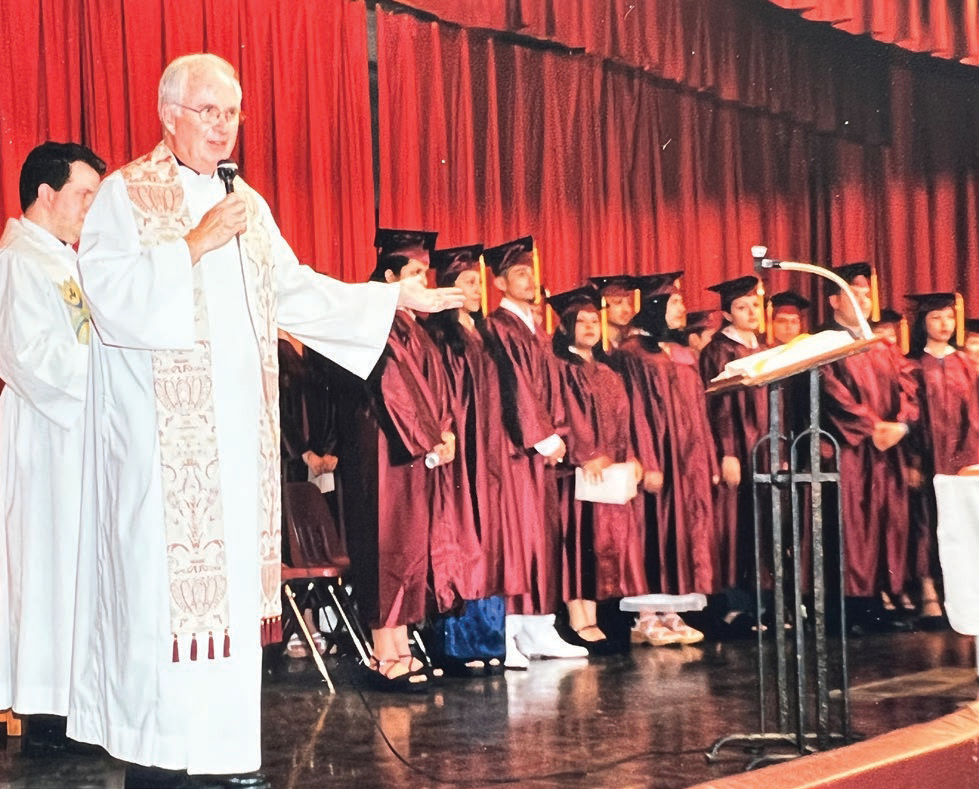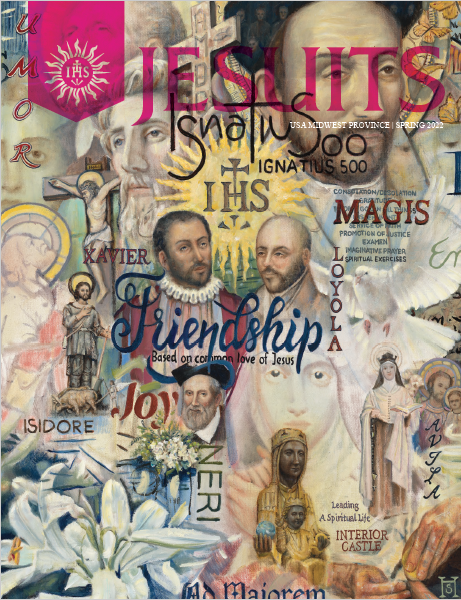
Father John Foley, SJ, retired this year after nearly three decades at the forefront of the Cristo Rey movement.
By Amy Korpi
Nearly 30 years ago, Fr. John P. Foley, SJ, was serving happily in Peru, thinking he very well might be there the rest of his life. Except for a brief period as a student counselor at Loyola Academy in Wilmette, Illinois, he had been working in education and school administration in Peru from 1961 to 1995—including assignments as president of two Jesuit high schools there.
Then his Chicago provincial visited with an idea. Well, it was actually an idea of an idea. Father Foley recalls, “He said, ‘We want to do something in education in the Pilsen neighborhood on the southwest side of Chicago. And we want you to take a leadership role.’”
At the time, the Pilsen neighborhood—while rich in Latinx culture—was characterized by poverty, gang violence, and limited educational options.
In true Jesuit fashion, Fr. Foley got on a plane to “do something in education” back in his hometown of Chicago.
That’s where Fr. Jim Gartland, SJ, enters the story. Already friends with Fr. Foley and hoping to work in Peru, he was instead assigned to ask the people of the Pilsen neighborhood what they needed and to determine what could be done to meet those needs. Literally going door-to-door, Fr. Gartland learned that people wanted a Catholic high school that would provide a college preparatory education for their children.
“Now we had our assignment. But we didn’t have a clue how we were going to pay for it,” Fr. Foley recalls with a chuckle. Fundraising would undoubtedly be critical, but it was going to take more than that. The leadership team met with Rick Murray, a lawyer who was involved with similar endeavors and known for his original thinking. “Fortunately, he didn’t laugh us out of his office,” says Fr. Foley, and Murray ended up posing a question: “What if every student had a job that underwrote student tuition?”
The groundbreaking Cristo Rey model featuring a corporate work study program was born.
Inspiration, Passion, and Humility
The next question was who would implement the work study program. Father Foley knew he needed someone with business acumen.
Around that time, Preston Kendall—who had been climbing the corporate ladder in insurance and financial services—was feeling called to a new career. When he saw an article about Fr. Foley starting a school in the Chicago Sun Times, he remembered meeting the Jesuit during a servant leadership trip to Peru when he was a student at Loyola Academy.
Kendall recalls, “I called Fr. Foley and asked how I could help. He in turn asked me, ‘When can you get here?’ So, I think it was the next day, John and I walked around Pilsen. He told me about the school and its work study program and that a businessperson was needed to figure it out. His enthusiasm for the project was contagious. I went home that night and told my wife, ‘I think I have to do this.’”Shortly thereafter, Kendall became the architect of the work study program—which has become a defining feature of all the schools in today’s Cristo Rey Network. He has also played many other roles within the Cristo Rey movement—including his current position as president of Cristo Rey St. Martin College Prep in Waukegan, Illinois.
Kendall is an example of several facets of “the Foley effect.” He explains, “John is so joyful and passionate that you remember him years after meeting him. And while he is astute about identifying the right people for the right jobs and then inspiring them to join the mission, he also has a humility that makes him open to trying new things and giving people the autonomy to adapt on the front lines. The depth of his faith gives him the freedom to go where God is leading him and to inspire us to use our gifts to do the same.”
“In short,” he adds, “John is not interested in why something can’t be done. He’s interested in how we can do it.”
Openness, Optimism, and Contagious Energy
Being open to novel ideas can lead to unexpected blessings. “The work study program was a brilliant financing model—paying about three-quarters of the bills—but we soon realized it was also a great educational model,” Fr. Foley says. “Students were exploring careers and possibilities they hadn’t been exposed to before. They were excited, their families were amazed, and their self-esteem went through the roof. They came to understand why going to school was so important, and we came to understand that the work study program was critical to the whole Cristo Rey experience.”
Fr. Foley with Cristo Rey Chicago students in 2002
Gustavo Rodriguez, a graduate of Cristo Rey Chicago’s first class, testifies to the transformational impact of the work study program, as well as Fr. Foley’s influence on him personally and professionally.
Today Rodriguez is director of the Office of Evangelization and Catechesis for the Diocese of Austin (Texas). Earlier in his career, he worked within the Cristo Rey movement— helping to open the third school in the nation with a similar program, then serving there as a teacher, admission director, and work study program director for ten years.
HIS ENTHUSIASM FOR THE PROJECT WAS CONTAGIOUS. I WENT HOME THAT NIGHT AND TOLD MY WIFE, “I THINK I HAVE TO DO THIS.”
“It was so clear that Fr. Foley truly believed everything he said to us. His excitement and energy are contagious. I consider him to be my very first motivational speaker,” Rodriguez says. “He inspired my peers and me to have confidence that we belonged in these workplaces—even as young, inexperienced kids who had never been in corporate downtown buildings—that we belonged in college, and that we belonged in the careers we chose. He encouraged us to celebrate our differences, to own them, because others could learn from us. That was clear when I attended Xavier University. Not only was I often the only Hispanic student in a classroom, but I was the only one with my level of work experience.”
“Society in general underestimates young people from low-income, diverse communities,” adds Kendall. “And when they’re not recognized for their talents and gifts, that’s a loss for all of us.”
The Cassin Educational Initiative Foundation is one of the many organizations that agree.
When California venture capitalist B.J. Cassin heard about Cristo Rey Chicago, he decided to visit. “We figured we’d ask him for some funds for our school,” Fr. Foley says. “After the tour he asked what we wanted. I hadn’t thought of it until just then, but I dared to say, ‘We want you to help replicate this model around the country.’ He called the next day and said he and his wife were going to set up a foundation to do exactly that, and therefore create more accessible private schools.”
The Foley Effect: Facts and Figures
During his tenure as president of Cristo Rey Chicago, Fr. Foley hired all personnel, oversaw construction of 150,000 square feet of classroom and recreation space, and spearheaded recruitment. He and his team raised more than $26 million, including a $2 million endowment. And the tradition he established became a national model for urban education that’s been highlighted on 60 Minutes, in Newsweek and Fast Company, and by numerous other media.
When Fr. Foley received the Presidential Citizens Medal from President George W. Bush, he was lauded for successfully reaching
“some of our nation’s most vulnerable youth and [instilling] in them a love of learning,” doing so via by partnering with the community, providing “opportunities for young people to achieve their dreams,” and helping his “fellow citizens lead lives of integrity and achievement.”
Father Foley was also honored by the Obama White House as a Champion of Change, by the National Catholic Education Association with its Seton Award, and by several universities with honorary degrees.
But most important to him is doing God’s work to transform lives. As he says in the Cristo Rey credo, “Through the Spirit who lives in each one of us, we should expect, if we follow Jesus, to accomplish absolutely novel and startling things . . . May we have faith in a dream so ambitious as to border on the delusional with a healthy disregard for conventional thinking . . . Viva Cristo Rey!”
Leadership, Trust, and Gregariousness
Father Foley speaks at Cristo Rey Chicago’s graduation ceremony in 2000.
Thirty years ago, when Fr. Gartland found out his feasibility study was coming to fruition, he knew Fr. Foley was the man for the job: “He had run schools in Peru and is bilingual (and thus could talk directly with Spanish-speaking families). He’s able to relate to everyone from an incoming student to a corporate Father Gartland served as pastor of Cristo Rey Chicago in the beginning and moved into the president’s position after Fr. Foley assumed leadership of the Cristo Rey Network, a national association that now includes 38 schools following the model.
“John has often said a Jesuit’s job is to work himself out of a job—introduce people to Jesus and the work and then go somewhere else where the need is greatest,” says Fr. Gartland. “That takes trust, but if you’ve done a good job establishing an apostolate, it works.”
The truth of that statement is evidenced by the fact that several of the Network’s schools are sponsored by Catholic orders other than the Jesuits, and many are led by laypeople. Father Foley most recently served as chair emeritus and chief mission officer of the Cristo Rey Network, and he is now enjoying his well-earned retirement. @CEO. And he’s gregarious and has a huge heart.”





